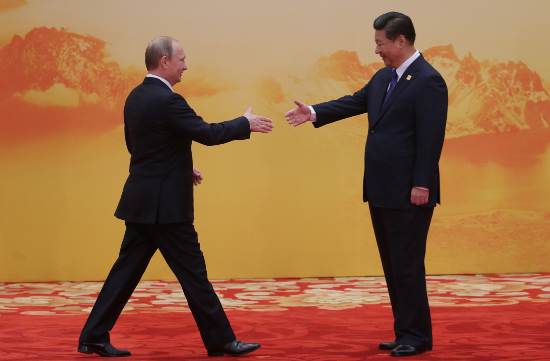« End Games of Modernity – a Convergence of crises | Home | After Collapse, What Next? »
An Unprecedented Geopolitical Tilt
By Karl North | March 27, 2022
We are seeing a planet-wide shift in geopolitical ascendency that is political, economic and cultural, and is unprecedented in the last five hundred years. It is a slow process that one could best describe as tectonic in scale, like a slanted table set with nations all sliding in one direction, which gradually rights itself, becomes flat, then starts to incline in another direction. As this change will affect all humanity to one degree or another, it is important to be aware of the acceleration of the process that can be witnessed at the present time and to begin to adapt to its consequences. This essay is an attempt to describe the driving forces.
A number of irreversible processes are in play to contract all industrial economies permanently. Planetary depletion of finite natural resources – fossil energy and minerals – is undermining all economies. However, in addition, related irreversible trends are upsetting economies in the Western nations, causing them to collapse first, for reasons I will explain. The decline of the West has freed other nations from US imperial subservience to emerge as a counter force.
At the outset, I want to at least raise the question of who or what is causing the tectonic tilt, as keeping it in mind may assist a reading of the causes. A number of those who study society from the perspective of political economy – the concentration of power and wealth and the pattern of decision making that flows from it – are seeing indications that the apparent step by step disintegration of the West may be a controlled demolition on the part of ruling elites, or at least an attempt of it. According to this hypothesis, elites fabricate disasters like “pandemics” and conjure evil enemies to blame for deepening impoverishment, and thus create a climate of fear as a way of building assent to a soft dictatorship.
Others see the decline of the West as a system of private control of power and wealth that is increasingly spinning out of control and collapsing due to inherent contradictions that elites could not foresee, or at least could not prevent. My view encompasses a degree of both perspectives: some elite factions anticipated the collapse and are trying various ploys to deflect the blame from themselves. Others, prone to desperation as problems multiply, are putting off the inevitable with make-shift responses that cause more harm in the end.
Whether controlled or not, the factors contributing to the decline of the West and the rise of a constellation of powers led by China and Russia can be outlined as follows:
- The end of the dollar as the global reserve currency
- Internal contradictions of the capitalist system
- The emergence of new superpowers
- Repeated policy disasters in the Western reaction to the shift
I will discuss these as dynamic, interdependent processes.
The End of the Petrodollar Supremacy
For over a century, many peoples of the earth have suffered an economic exploitation and political subjugation by the US anchored by the dollar as the world reserve currency. An agreement in the early 1970s strengthened this scheme whereby Saudi Arabia, followed by other similar oil producers, would sell oil, the key industrial energy source, only in dollars, and in return the US would protect their medieval monarchies from modernization or overthrow. Analysts have dubbed this state of affairs the petrodollar era because oil replaced gold as the standard underpinning the value of the dollar.
In recent years, a number of non-Western nations have sought to escape from the dollar trading system and have collaborated to build an alternative. Leading the way, Russia and China have steadily increased bilateral trade over the last six years, with a declining percentage of it in dollars. Then a long-term Chinese trade deal with Iran removed a large chunk of Iranian oil exports from the dollar trade zone. More recently, Saudi Arabia is finalizing a deal to sell oil in Yuan with China, their largest customer.
Because such oil trades directly threaten to end the reign of the petrodollar system and the reserve currency status of the dollar, previous oil producer attempts to avoid trading in dollars have triggered invasions (Iraq, Libya) by the US and its NATO vassals. When the dollar is no longer the world reserve currency, the US economy will suffer a major shock because it will no longer be able to print dollars to pay for imports that its deindustrialized economy no longer produces.
Now, in what may be the coup de grace for the petrodollar system, Russia, in response to Western sanctions, has decided to take payment only in rubles for all exports to hostile (mostly Western) countries. The global economy relies on Russian exports of essentials like energy (oil, gas, enriched uranium) and microchip raw materials. Europe relies on Russia for nearly half of its energy consumption. The US needs to import significant amounts of Russian oil.
Moreover, after stealing the gold reserves of nations such as Venezuela, Afghanistan, Libya, Iraq and Ukraine, and impounding dollar reserves of Russia, Western banks have proven themselves unreliable depositories. Countries are dumping dollar reserves. If all the above-described actions hold, they will accelerate de-dollarization and the geopolitical tilt away from the West.
Inherent Contradictions of Capitalism
Political economists have exposed the mechanisms of the capitalist system whereby, over time, wealth and power concentrate in a minority class. Using this accumulated wealth and power to serve its interests better, the power elite captures the apparatus of state and achieves control of all federal agencies originally mandated to force business interests to serve the public.
Freed from the last vestiges of regulatory control, unfettered laissez faire capitalism inevitably distorts every sector of the economy to maximize private profit over the public good. Economic sectors claiming to serve the public interest – the pharmaceutical industry, the weapons industry, industrial agribusiness, communications, scientific research, etc. – fall under monopoly control, becoming legalized rackets for shaking down the public. So, like the private-public partnership known as Japan Inc., the economic sectors under capitalism evolve into War Inc., Healthcare Inc., Agri-food Inc., etc.
As it turns out, spending in the medical industrial complex, at $3.8 trillion is more than twice as much as the military at $1.7 trillion. What the pandemic caper revealed when its lies were fully exposed was a gamut of corruption that showed just how powerful big pharma actually is. The corruption encompassed a range of agencies from the World Health organization, the Food and Drug Administration, the Center for Disease Control, the Health and Human Services Agency including its research arm, the National Institute of Health. It showed that the corruption reached into the Patent Office, university departments and scientific journals. All in all, it is astonishing that the US public has been persuaded to live with what can only be described as a political economy of legalized racketeering.
Also perplexing is that the public has mentally normalized the deindustrialization of America. After global trade and financial infrastructure and emergent economy growth created favorable conditions, the export of the US industrial base to cheap labor regions, primarily Asian, followed as a normal function of a capitalist system serving its primary goal: to maximize profit whatever the social or ecological cost.
The offshoring of much of the US industrial base to countries like China was a most un-American, anti-patriotic act of class warfare, but the international banker elites who provided the investment capital sold the industrial decline to the US public as serving US interests, just not saying whose class interests. And China’s oligarchs got US technology and intellectual property, so both oligarchies benefited. Europe is suffering the same loss of industrial base, but more slowly due to a stronger public sector in its economy.
The consumer base that furnishes the profits in the West has declined along with the industrial base, but that matters little to international banker elites because 1) in recent decades they have delivered cheap credit to fuel the consumerism temporarily in the West while 2) The emergent economies the bankers invest in grow their consumer market replacement.
Meanwhile, elites continue to concentrate wealth in their hands by replacing the declining productive economy in the West with a speculative one, kept alive for a time by government bailouts and money printing that drain wealth from the public via inflation.
The export of the industrial sector increasingly leaves the US as a warehouse economy distributing foreign-made goods. Of the remaining economy, the military industrial complex survives because it has a captive consumer – the tax payer. The medical industrial complex also relies on the tax payer in part, and on the essential service the public so desperately needs.
However, the inconvenient consequences of the above-described workings of the capitalist system are reaching a critical mass. The downsizing and resultant debt peonage left generations impoverished and angry relative to their parents’ generations. Civil unrest is rising. Fear campaigns like the pandemic and hate propaganda against Russia and China are not fully succeeding in deflecting public attention from the core economic problems. Over time, as the shock value wears off, the desperation policy of an endless succession of emergencies is achieving the discredit of all major institutions.
Western finance is painted into a corner. Raising interest rates is off the table because of all the debt that will be called in, which would crash the stock market. The likely alternative is to hold rates low, which will make it impossible to control inflation. So, the goal will be to keep rigging the stats and the narrative to delay public perception of inflation as long as possible, to put off a tipping point where awareness rips through the collective consciousness. When that happens, hoarding begins and shelves go bare quickly, and hyperinflation occurs, savings evaporate, etc.
Policy Fiascos that Accelerated the Tilt
Over the last 30 years, and especially since it orchestrated the overthrow of an elected government in 2014, the US has created a Nazi police state in Ukraine that has demonstrated genocidal intentions against the Slavic, mostly Russian majority. The goal has been to provoke a Russian intervention to protect these Russian populations, with the ultimate objective to 1) Use the political fallout to shore up US control of its European vassals, and 2) hopefully weaken Russia by dragging it into a quagmire in the Ukraine conflict. The US cannot militarily oppose Russia, so it resorts to sanctions. However, all the sanctions are hurting the Western economies and ultimately strengthening the Russian economy.
Also, the war in Ukraine is driving China and Russia closer together, exposes the fault lines in the NATO alliance as some nations refuse to support the war or the sanctions, and is revealing the increasing vigor of the multipolar world as nations like India refuse to toe the US party line.
Conclusion
The West faces insurmountable problems internally as well as in external relations. As the West declines, China has become the largest economy in the world, and is allied with a Russia that has achieved military technological superiority and covers the largest land area in the world. This alliance has become the basis of a multipolar counter weight to five centuries of Western dominance. Like Russia and China, many of the economies that are attracted to the multi-polar world have mixed economies and do not share the extreme laissez-faire economic model of the US called neoliberalism. Asian cultural values will likely gain prominence as well. The geopolitical tectonic plates are shifting as aware observers watch in fascination at this extraordinary process.
Topics: Political and Economic Organization, Social Futures, Peak Oil, Relocalization, Uncategorized | No Comments »


